Table of contents
- 1. Agro-Based Processing Unit
- 2. Handloom and Textile Manufacturing
- 3. Paper Plate and Disposable Products Unit
- 4. Bamboo and Cane Product Manufacturing
- 5. Dairy Product Manufacturing (Paneer, Ghee, Flavored Milk)
- 6. Herbal and Ayurvedic Product Manufacturing
- 7. Jute Bag Manufacturing
- 8. Incense Stick (Agarbatti) Manufacturing
- 9. Bakery and Confectionery Unit
- 10. Sanitary Napkin Manufacturing
- Conclusion
- Frequently Asked Questions (FAQs)
Bihar, with its rich agricultural base, skilled artisans, and growing economy, presents a fertile ground for small-scale manufacturing businesses. Starting a small manufacturing unit offers numerous benefits:
- Low Investment: Many of these businesses can be started with relatively low initial capital.
- Job Creation: They contribute significantly to local employment.
- Local Demand: Many products cater to the existing local market, reducing marketing costs.
- Government Support: The Bihar government, along with the central government, offers various schemes to promote small-scale industries. These include:
- PMEGP (Prime Minister’s Employment Generation Programme): Provides financial assistance for setting up new micro-enterprises.
- MUDRA Loan: Offers loans up to ₹10 lakh to small businesses.
- MSME Support: Various schemes for technology upgradation, marketing assistance, and skill development.
- Bihar Industrial Investment Promotion Policy: Incentives for investments in various sectors.
Here are 10 easy-to-start small-scale manufacturing business ideas in Bihar, along with estimated initial investments:
1. Agro-Based Processing Unit

- Flour Mill: Procuring grains (wheat, maize, etc.), cleaning, grinding using a flour mill, sieving, and packaging.
- Oil Extraction: Sourcing oilseeds (mustard, soybean, etc.), cleaning, crushing, extracting oil using an expeller or solvent extraction method (small scale usually uses expeller), filtering, and packaging.
- Packaged Spices: Obtaining whole spices, cleaning, roasting (optional), grinding using a spice grinder, blending (for mixed spices), and packaging in airtight pouches.
- Pickles: Sourcing vegetables or fruits, washing, cutting, brining (in salt solution), adding spices and preservatives, and packaging in jars.
- Target Market: Households, local grocery stores, restaurants, wholesalers.
- Raw Material Sourcing: Directly from farmers, agricultural markets, and wholesale suppliers.
- Essential Machinery: Flour mill, oil expeller, spice grinder, packaging machine, weighing scales, basic processing equipment (cutting, cleaning).
- Key Considerations: Quality control of raw materials, maintaining hygiene during processing, effective packaging for shelf life, understanding local taste preferences
- Estimated Initial Investment: ₹50,000 – ₹5,00,000 (depending on the scale and type of machinery)
2. Handloom and Textile Manufacturing
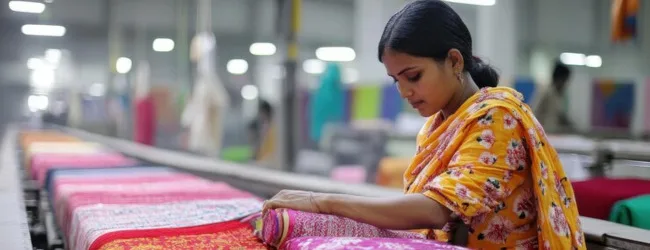
- Weaving Units: Procuring yarn (cotton, silk, jute), setting up the loom, weaving fabric according to designs (traditional or contemporary), finishing (dyeing, printing if applicable).
- Textile Printing: Buying plain fabric, preparing printing screens or using digital printing technology, mixing dyes, printing designs, drying, and finishing.
- Target Market: Boutique stores, handicraft shops, garment manufacturers, online retailers, export markets.
- Raw Material Sourcing: Yarn suppliers, fabric wholesalers, dye and chemical suppliers.
- Essential Machinery: Handlooms or small power looms, warping machine, dyeing vats (for dyeing), printing screens or digital printing machine, drying equipment, sewing machines (for value addition).
- Key Considerations: Skill in weaving or printing, design innovation (especially for Madhubani and Bhagalpuri styles), quality of fabric and dyes, marketing unique selling points.
- Bihar’s Heritage: Famous for Madhubani prints, Bhagalpuri silk, and traditional weaving. Ideas:
- Low Investment Weaving Units: Setting up small-scale handloom units.
- Textile Printing: Printing designs on fabrics.
- Export Potential: Products have good export potential, especially for unique designs. Estimated Initial Investment: ₹20,000 – ₹2,00,000 (depending on the number of looms/printing equipment)
3. Paper Plate and Disposable Products Unit
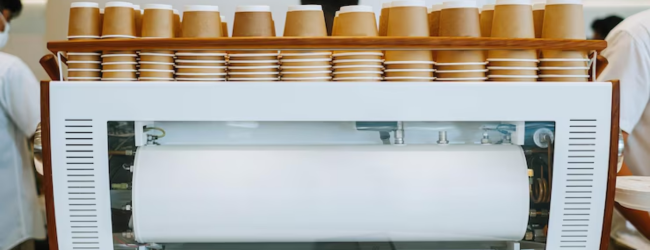
- Sourcing paper rolls or biodegradable raw materials, feeding them into a paper plate making machine or other disposable product forming machines (like for cups or bowls), shaping and cutting, and packaging.
- Target Market: Caterers, event organizers, restaurants, street food vendors, grocery stores.
- Raw Material Sourcing: Paper mills, biodegradable material suppliers.
- Essential Machinery: Paper plate making machine (manual, semi-automatic, or automatic), die-cutting machine (for specific shapes), packaging machine.
- Key Considerations: Quality of raw material (thickness, food-grade), production capacity, cost-effectiveness, marketing to bulk consumers.
- Demand: High and increasing demand for eco-friendly disposable products.
- Costs: Relatively low training and machinery costs.
- Estimated Initial Investment: ₹1,00,000 – ₹5,00,000 (for machinery and initial raw materials)
💡 Pro Tip: If you want to start a Business but have too many doubts, connect with a Business expert from Boss Wallah for guidance – https://bw1.in/1116
4. Bamboo and Cane Product Manufacturing
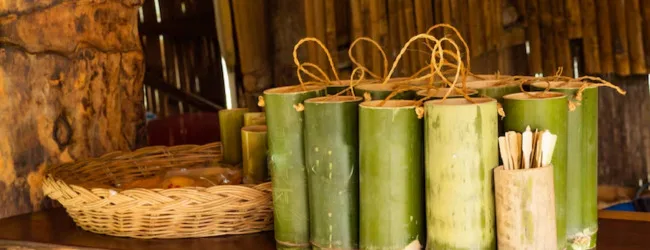
- Procuring bamboo or cane, treating it (cutting, seasoning, shaping), crafting products (furniture, baskets, decorative items) using hand tools and simple machinery, finishing (varnishing, polishing). Target Market: Home décor stores, furniture retailers, handicraft shops, export markets.
- Raw Material Sourcing: Bamboo farms, local markets (especially in North Bihar).
- Essential Machinery: Cutting tools, shaping tools, simple drilling machines, weaving tools (for baskets), polishing equipment.
- Key Considerations: Skill in craftsmanship, design appeal, durability of products, sustainable sourcing of bamboo.
- Bamboo Availability: Abundant bamboo in North Bihar.
- Products: Crafts, Furniture, Home Décor
- Government Support: Support for tribal and rural artisans involved in this sector. Estimated Initial Investment: ₹30,000 – ₹3,00,000 (depending on the scale and type of products)
5. Dairy Product Manufacturing (Paneer, Ghee, Flavored Milk)
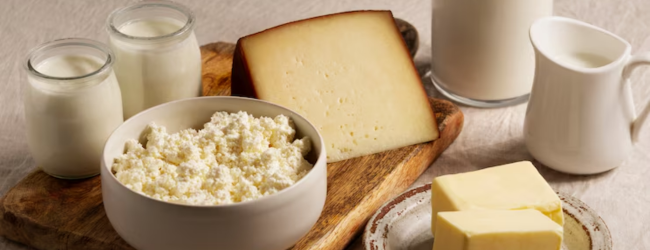
- Paneer: Sourcing milk, heating and coagulating it (using lemon juice or citric acid), separating the whey, pressing the curd to form paneer blocks, and packaging.
- Ghee: Sourcing milk or cream, churning to separate butter, heating butter to clarify it into ghee, filtering, and packaging.
- Flavored Milk: Sourcing milk, adding flavors (chocolate, strawberry, etc.), sweeteners, and stabilizers, pasteurizing (heating to kill bacteria), and packaging in bottles or pouches.
- Target Market: Households, grocery stores, sweet shops, restaurants.
- Raw Material Sourcing: Local dairy farmers, milk cooperatives. Essential Machinery: Milk storage tanks, heating equipment, coagulation vats, pressing equipment (for paneer), churning machine (for ghee), pasteurizer (for flavored milk), packaging machine, refrigeration units.
- Key Considerations: Quality of milk, adherence to FSSAI standards, maintaining hygiene, effective cold chain management.
- Estimated Initial Investment: ₹1,50,000 – ₹7,00,000 (including refrigeration and processing equipment)
6. Herbal and Ayurvedic Product Manufacturing
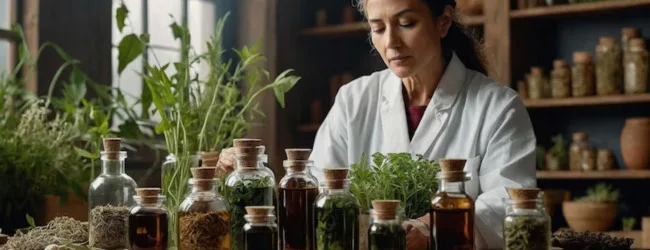
- Sourcing raw herbs, cleaning and drying them, grinding or processing them into powders, extracts, or oils, formulating products (churna, oils, capsules), and packaging.
- Target Market: Ayurvedic clinics, pharmacies, health food stores, online retailers.
- Raw Material Sourcing: Local herb growers, forest produce collectors, wholesale suppliers of herbs.
- Essential Machinery: Drying equipment, grinding machines, extraction equipment (depending on the product), mixing and blending equipment, capsule filling machine (if applicable), packaging equipment.
- Key Considerations: Accurate identification and sourcing of herbs, adherence to AYUSH and FSSAI licensing requirements, maintaining quality and potency of products, effective branding and marketing emphasizing health benefits.
- Growing Interest: Increasing interest in herbal and Ayurvedic products.
- Licensing: Requires AYUSH and FSSAI licenses.
- Branding: Strong branding potential.
- Estimated Initial Investment: ₹1,00,000 – ₹5,00,000 (depending on the range of products and processing)
ALSO READ | 10 Easy-to-Start Small Business Ideas in Odisha
7. Jute Bag Manufacturing
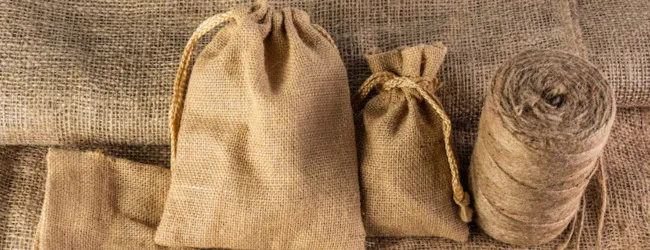
- Procuring jute fabric, cutting it into desired shapes, stitching the pieces together using sewing machines, adding handles and other accessories, and finishing.
- Target Market: Retail stores (for shopping bags), promotional companies, export markets (for eco-friendly bags).
- Raw Material Sourcing: Jute mills in West Bengal and other East Indian states, wholesalers of jute fabric and accessories.
- Essential Machinery: Sewing machines (industrial grade), cutting tables, stitching machines for handles, eyelet machines (if needed), printing equipment (for branding).
- Key Considerations: Quality of jute fabric, stitching strength, design and style appeal, cost-effectiveness to compete with other bag materials.
- Eco-Friendly: Eco-friendly product with high demand.
- Market: Local fairs and online market.
- Estimated Initial Investment: ₹80,000 – ₹4,00,000 (for sewing machines and raw materials)
8. Incense Stick (Agarbatti) Manufacturing
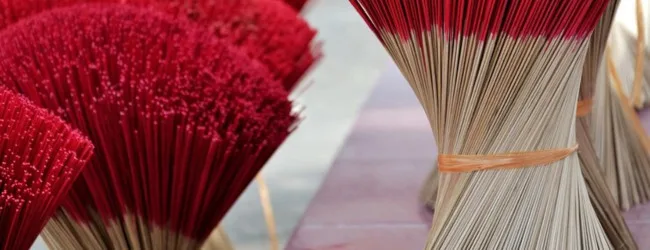
- Mixing raw materials (bamboo sticks, charcoal powder, jigat powder, fragrance), applying the mixture to the bamboo sticks using a manual or automatic machine, drying the sticks, dipping them in fragrance oil, and packaging.
- Target Market: Religious institutions, households, grocery stores, gift shops.
- Raw Material Sourcing: Bamboo suppliers, charcoal powder suppliers, jigat powder suppliers, fragrance oil suppliers.
- Essential Machinery: Agarbatti making machine (manual or automatic), mixing drum, drying racks, fragrance dipping equipment, packaging machine.
- Key Considerations: Quality of fragrance, consistency of the coating, packaging to preserve fragrance, cost-effective production.
- Steady Demand: Religious and cultural usage ensures consistent demand.
- Production: Easy production process with low investment.
- Employment: Generates employment, especially for women.
- Estimated Initial Investment: ₹20,000 – ₹1,50,000 (for machinery and raw materials)
ALSO READ | 10 Fast-Growing Small Business Ideas in Gurgaon To Start in 2025
9. Bakery and Confectionery Unit
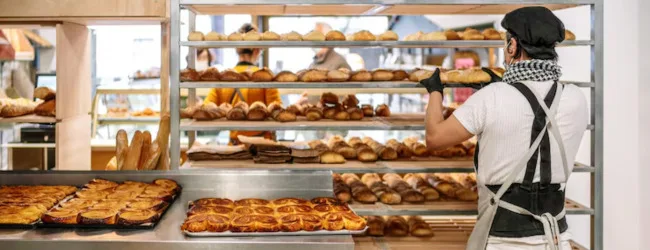
- Mixing ingredients (flour, sugar, butter, etc.) according to recipes, kneading dough (for bread and pastries), shaping and baking in ovens, preparing icings and decorations (for cakes and pastries), and packaging.
- Target Market: Local consumers, schools, offices, grocery stores, event organizers.
- Raw Material Sourcing: Flour mills, sugar suppliers, dairy product suppliers, baking ingredient wholesalers.
- Essential Machinery: Ovens (small to large capacity), mixing machines, kneading machines, baking trays, display counters, packaging materials.
- Key Considerations: Taste and quality of products, hygiene in the baking process, attractive presentation, effective distribution channels
- Demand: Urban and rural demand for baked products.
- Setup: Can start with a small oven and scale up to automated units.
- Supply Chain: Supply to schools, stores, and local markets.
- Estimated Initial Investment: ₹50,000 – ₹10,00,000 (depending on the scale and equipment)
10. Sanitary Napkin Manufacturing

- Sourcing raw materials (non-woven fabric, absorbent core material, back sheet, adhesive), feeding them into a sanitary napkin making machine, which cuts, shapes, and seals the napkins, and then packaging them.
- Target Market: Local women, schools, NGOs, government health programs.
- Raw Material Sourcing: Suppliers of non-woven fabric, absorbent polymers, polyethylene film, and adhesives.
- Essential Machinery: Sanitary napkin making machine (manual, semi-automatic, or automatic), sealing machine, packaging machine.
- Key Considerations: Quality and absorbency of the napkin, cost-effectiveness to make it affordable, effective marketing and distribution, especially in rural areas, and awareness campaigns on hygiene.
- Growing Awareness: Increasing awareness of women’s hygiene.
- Machinery: Low-cost manufacturing machines are available.
- Opportunity: Social impact + commercial opportunity.
- Estimated Initial Investment: ₹1,00,000 – ₹6,00,000 (for machinery and initial stock)
Need Expert Guidance?
Starting a business can be challenging, but you don’t have to do it alone! At Boss Wallah, our 2,000+ business experts are ready to provide valuable insights and guidance. Whether you need help with marketing, finance, sourcing, or any other area of any business, our business experts are here to help you succeed- https://bw1.in/1116
Confused about Which Business to Start?
Want to start your own business but unsure which one to choose? Explore Boss Wallah, where you’ll find 500+ courses by successful business owners, featuring practical, step-by-step guides on starting and growing various businesses. Find your perfect business idea today – https://bw1.in/1111
Conclusion
Bihar offers a conducive environment for starting and growing small-scale manufacturing businesses. By leveraging local resources, government support, and market demand, entrepreneurs can create successful ventures and contribute to the state’s economic growth. The estimated initial investments provided offer a starting point for planning and securing necessary funding.
Frequently Asked Questions (FAQs)
1. What are the most promising small-scale manufacturing business ideas in Bihar based on initial investment?
- Incense stick manufacturing and small-scale handloom units often have the lowest initial investment requirements.
2. What government schemes in Bihar can help with the initial investment for a small manufacturing business?
- PMEGP provides subsidies on project costs, and MUDRA loans can help finance the initial investment.
3. Are the estimated initial investments inclusive of working capital?
- The estimates primarily cover the cost of setting up the unit (machinery, basic infrastructure, and initial raw materials). Working capital for the first few months of operation will be an additional requirement.
4. How can I reduce the initial investment for a manufacturing business?
- Consider starting on a smaller scale, opting for used or refurbished machinery (where appropriate), and utilizing shared workspaces or rental facilities.
5. What factors can influence the initial investment of these businesses?
- The scale of operation, the quality and type of machinery, the location of the unit, and the cost of raw materials can significantly impact the initial investment.
6. Should I rely solely on the estimated initial investment figures?
- No, these are rough estimates. It’s crucial to conduct thorough market research and prepare a detailed project report with accurate costings based on your specific plan.
7. Where can I get more precise information on the cost of machinery for these businesses in Bihar?
- You can contact local machinery suppliers, attend industry exhibitions, and consult with existing businesses in the same sector in Bihar.
8. What are some often overlooked initial costs when starting a manufacturing unit?
- These can include registration and licensing fees, utility deposits, initial marketing expenses, transportation costs, and contingency funds for unexpected expenses.


